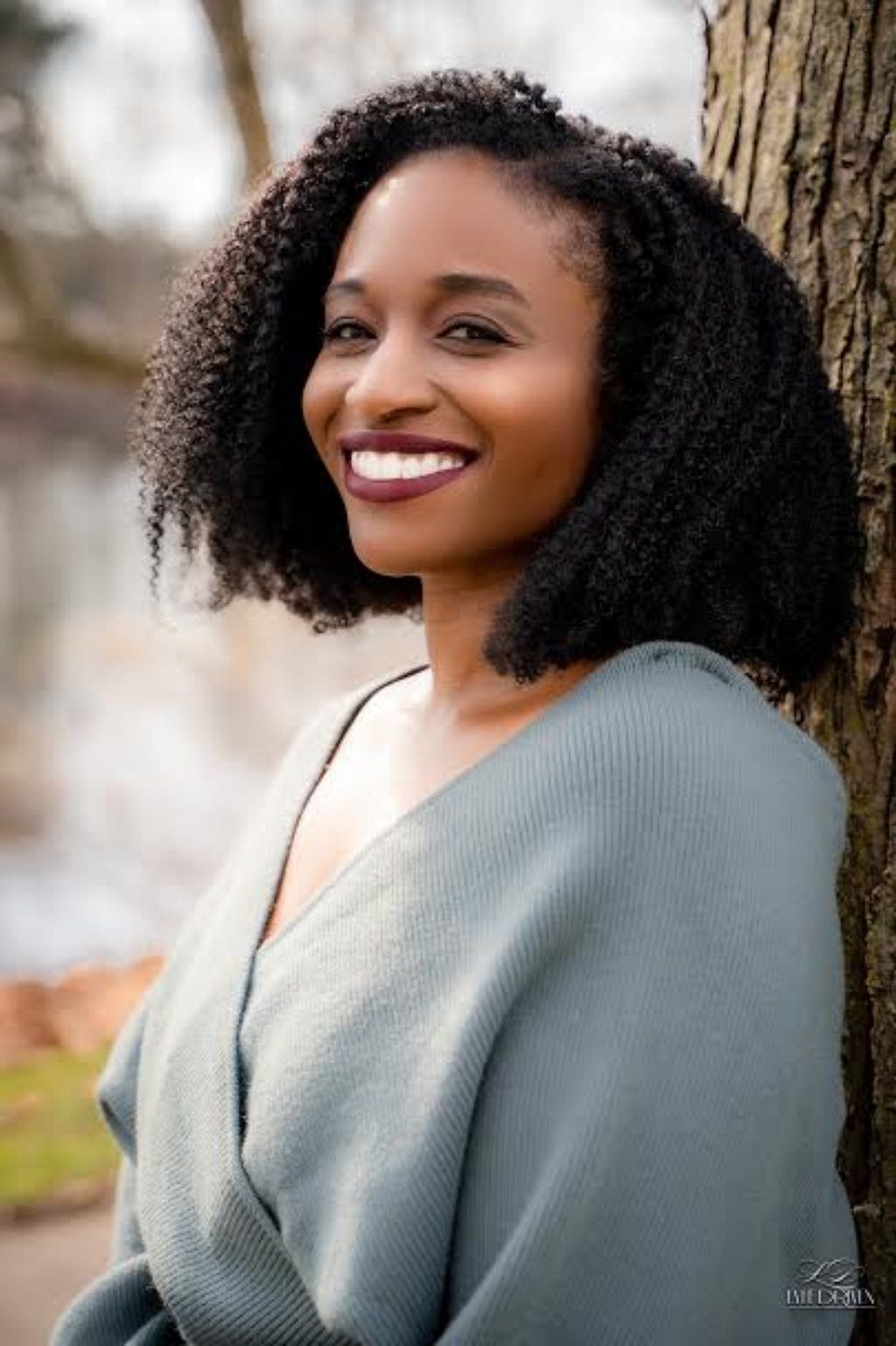
Patience might be a virtue, but it is certainly not a virtue that I have attained. I’m not good at being patient. I wonder if any of us are. It doesn’t matter what stage you are in life, you’re going to be waiting for something. I have learned that patience is more than the outcome, but about the journey while you’re waiting. What kind of person am I growing into while I am waiting? What areas do I need to work on while I’m waiting? Am I enjoying the journey or just waiting for the end? These are all questions I must continuously ask myself on this journey of life. Like the author says above, patience is a spiritual road.
As part of my series about “individuals and organizations making an important social impact”, I had the pleasure of interviewing Khristi Lauren Adams.
Khristi Lauren Adams is a speaker, author, youth advocate and ordained Baptist minister. Khristi is the author of Parable of the Brown Girl, Unbossed: How Black Girls Are Leading the Way and Black Girls Unbossed: Young World Changers Leading the Way. She works as Dean of Spiritual Life & Equity at the Hill School. She is the Founder & Director of “The Becoming Conference”, an annual retreat and conference and leadership cohort designed to empower, educate & inspire girls between the ages of 13–18.
Thank you so much for joining us in this interview series! Can you tell us a story about what brought you to this specific career path?
In each place my career has taken me, I have had the opportunity to develop powerful relationships with black girls. My life has been significantly impacted for the better by listening to these girls. My conversations with them have changed how I see God and how I see the world around me. I always said to myself that if I were ever given the platform, I would make it a priority to center and highlight the lives and experiences of Black girls. Recently, that door has opened through publishing books and also through my an annual conference and retreat that I started called, “The Becoming Conference” for Black and Brown girls.
Can you share the most interesting story that happened to you since you began leading your company or organization?
When I first pitched the proposal for my first book, the initial proposal was rejected. That particular publishing company felt that the demographic of focusing on Black girls was too narrow. It was suggested that I revise the proposal to broaden the demographic to include all girls. This lit a fire underneath me, because the point I was trying to make was that people don’t seem to care about Black girls and that Black girls are always pushed to the margins. The initial response from this publishing company, affirmed that. From that point on, I was determined to get the book published.
Can you share a story about the funniest mistake you made when you were first starting? Can you tell us what lesson you learned from that?
Before I began typing the words to my first book, I googled looking for the best book writing apps. I researched book writing programs and apps for months before realizing that all I needed to do was open up Microsoft Word and begin a document. For some reason I thought authors had some special program they used to type on.
Can you describe how you or your organization is making a significant social impact?
My career has taken me into a variety of spaces, and in each one, I have had the privilege to experience a group of black girls with vivacious spirits and colorful personalities. They each have a story to tell. Typically, their lives are ones of amazing resilience while being discounted and overlooked, unseen and unheard. In my career, I have combined my education and pastoral practices to address the reality of black girls’ lives and experiences. I have been a teacher to black girls in educational settings. I have been a counselor to black girls in therapeutic settings. I have been a pastor to black girls in pastoral settings. I have been a mentor to black girls in community-based settings.
Can you tell us a story about a particular individual who was impacted or helped by your cause?
One 14-year-old girl I wrote about and had been counseling was on a challenging path when we met. She was getting suspended often from fighting in school. Her life up until the point we met was filled with disappointment and trauma. We worked through her justified anger in our sessions. It was a difficult journey, but eventually she was the one who decided to make positive changes in her life. Her grades improved. I wrote about some of her changes in my book, “Parable of the Brown Girl.” She once said to me, “I still fight, but I won’t just fight because I’m mad. I will if you’re starting rumors or if you keep coming to my face and talking. But I don’t fight like I did back then. Before, I used to fight just to fight.” The year after she ran for school president. To say I was proud was an understatement.
Are there three things the community/society/politicians can do to help you address the root of the problem you are trying to solve?
Center the stories of Black girls in celebration of their lives and achievements.
Highlight the stories of Black girls who are on the receiving end of injustice in society.
Create policy that protects Black girls, revise ones that discriminate against them.
How do you define “Leadership”? Can you explain what you mean or give an example?
Professor and leadership expert, Peter Northouse defines leadership as “a process whereby an individual influences a group of individuals to achieve a common goal.” I use this as well as his leadership theory definitions throughout my book, “Unbossed: How Black Girls Are Leading the Way.” Along with this definition, I would add that leadership is a person who strives to use their unique gifts to influence and inspire people. The girls in my book are all leaders because they have a clear focus and goals. They lead with honest and integrity.
What are your “5 things I wish someone told me when I first started” and why. Please share a story or example for each.
- I wish someone told me to enjoy every part of the process and not to solely focus on the outcome.
- I wish someone told me to be kinder to myself on the hard days.
- I wish someone told me to always negotiate what I know my worth to be.
- I wish someone told me to cherish every minute of each day instead of focusing on the future so much.
- I wish someone told me to trust my intuition and my gut the first time I feel something; to never second guess myself.
You are a person of enormous influence. If you could inspire a movement that would bring the most amount of good to the most amount of people, what would that be? You never know what your idea can trigger. 🙂
Women like Monique Morris, Brianna Baker or Rebecca Epstein are all doing the important work of highlighting the double standard and discriminatory practices against Black girls. To me, they have started the movement and my hope is that I could continue to help aid the work of the movement.
Can you please give us your favorite “Life Lesson Quote”? Can you share how that was relevant to you in your life?
“The two hardest tests on the spiritual road are the patience to wait for the right moment and the courage not to be disappointed with what we encounter.”
― Paulo Coelho,
Patience might be a virtue, but it is certainly not a virtue that I have attained. I’m not good at being patient. I wonder if any of us are. It doesn’t matter what stage you are in life, you’re going to be waiting for something. I have learned that patience is more than the outcome, but about the journey while you’re waiting. What kind of person am I growing into while I am waiting? What areas do I need to work on while I’m waiting? Am I enjoying the journey or just waiting for the end? These are all questions I must continuously ask myself on this journey of life. Like the author says above, patience is a spiritual road.
Is there a person in the world, or in the US with whom you would like to have a private breakfast or lunch with, and why? He or she might just see this, especially if we tag them. 🙂
I would love to have lunch with Michelle Obama. Not just because she’s an inspirational, successful and influential human being, but because she is so authentic and down to earth. I would just love to have a conversation with her!
How can our readers follow you on social media?
You can follow me on Instagram @khristiadams or on twitter @khristilauren. I also have an author page on Facebook by searching just for my full name, Khristi Lauren Adams.
This was very meaningful, thank you so much. We wish you only continued success on your great work!
Social Impact Heroes: Why & How Khristi Lauren Adams Is Helping To Change Our World was originally published in Authority Magazine on Medium, where people are continuing the conversation by highlighting and responding to this story.
